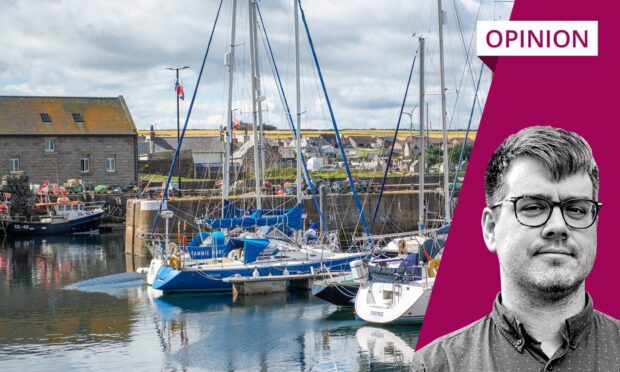Have you ever heard or read ‘Dreepin’ by Shane Strachan? It’s a poem about Aberdeen, oil and gas and the tumultuous relationship between the two.
Told in Shane’s Broch brogue, it examines the near-dependency Aberdeen has had on the sector, indicting through innuendo. It’s hilarious, and powerful.
The Doric voice which frames the story brings the issues even closer to home.
Peppered in the poem are those relatable phrases anyone in the north-east would be familiar with around the dinner table. ‘Mine and hud yer wheesht about those little spills and leaks’. It hits hard when you hear it told in your own words.
On Friday past, as part of the University of Aberdeen’s wonderful Wayword Festival, I was able to witness the full bore in person, as Shane performed the poem at Cowdray Hall, in an event on Scots Language in poetry, alongside Len Pennie.
The crowd left tickled by a comic performance, which unpicks a deeper well in any Aberdonian about what the city is.
Literature and art do a fab job of examining the social, economic and political issues around us, and the conversation at the event mused on how this is sharpened, or not, when Scots, or Doric, is used – the power, the freedom or the constraints of writing in your inner monologue, and how it helps us connect to our characters.
Do I even think in Doric anymore?
I wandered home after the event, and I thought about why I don’t write more in Doric, very much the tongue I was brought up in, not far from Shane. A few words fall in here and there, but predominantly I stick to the Queen’s. Maybe I should be a bit more adventurous.
I wondered if I even think in Doric anymore; it can be hard to tell when you are in effect multilingual.
I remember when I first arrived in Aberdeen, and I stepped away from a pal at college to take a phone call from my Mum or Mam.
Cue two minutes of very Whitehills chatter. I returned to him, put back on my Aberdeen voice and he told me hadn’t understood a word of what I had said on the phone. Weird what these posh lads from Kincorth cannae fathom.
It turns out 50 miles is further than you think, once the Doric we all speak some of the time has been twisted and turned through each little village.
I’ll always recognise someone who has spent a bit of time in Whitehills – it’s quite different from Portsoy or Banff or Turriff once your ear is attuned.
Like oil coming to Aberdeen in ‘Dreepin’, using ‘proper’ English to me always seemed like a jump into Modernity. You grow up, you speak right. Right?
We were always in trouble if we didn’t ‘speak properly’ at school
As young as I am (and I am!) I’m still from a generation who were given into trouble for speaking Doric at school. Ludicrous, innit?
Back at Wayword, Len and Shane had spoken about the discussions, or arguments, about the use of Scots and spelling.
How the lack of a formal structure can be problematic, but also freeing. Even though I’m not familiar with the exact agreed Doric spellings yi wid probly still ken fit I’m spikin aboot, if I typed in it, even if the spellcheck just had a different kind of fit.
Even after 20 years of mass internet and all the American telly before that we still have our dialects, buried somewhere deep into our psyches.
I recently came across a TikTokker, who will go unnamed, attempting to put on a more refined accent for a more international audience. ‘Is she from Macduff?’ thought I, and right enough Macduff Harbour appeared within a few videos more.
Perhaps we should all speak a bitty more Doric. Where we already do, maybe we should bring a wee bitty more into the more formal situations where we usually don’t. After all, it is unique to us and is a huge part of who we are.
I go back to ‘Dreepin’, Shane’s raucous, irreverent poem about Aberdeen’s chief economic fling of the last fifty or so years.
In the poem, oil itself speaks to the city and promises the very earth and what’s underneath it. Fantastical and silly, but all kept realistic and relatable because I hear it in my own accent.
The benefits, and the downsides, of the energy sector will be a debate for years to come in Aberdeen, swelling larger even as the city becomes less reliant on it. But to keep those conversations at least in part in Doric, our imperfect, imprecise Lingua Franca, is something to celebrate, and will hopefully halt us from getting too rude, or crude, with one another.
Colin Farquhar works as a creative spaces manager and film programmer in the north-east culture sector


Conversation